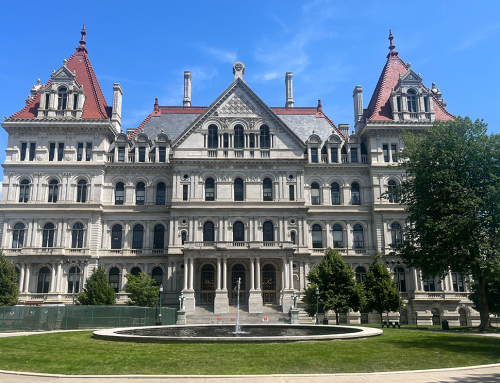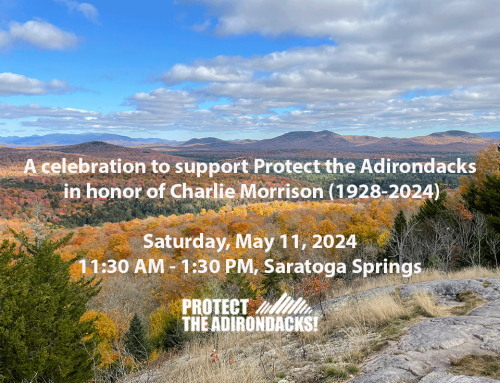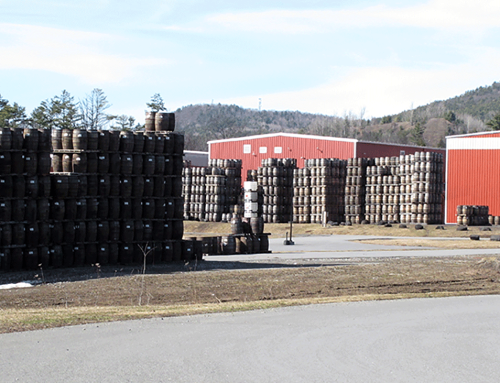By Charles Morrison
Protect’s Reply Brief for the Proposed Adirondack Club and Resort Project
This is the Introduction from the Reply Brief and Closing Statement of Protect the Adirondacks! Inc. in the matter of the application to the Adirondack Park Agency (APA Project 2005-100) to construct the Adirondack Club and Resort as proposed by Preserve Associates, LLC, prepared and submitted by John W, Caffry, of counsel, and Claudia K. Braymer, of counsel, of the firm of Caffry and Flower. 100 Bay Street, Glens Falls, N.Y. The full brief and closing statement may be viewed by clicking here.
INTRODUCTION
In this Reply Brief and Closing Statement Protect the Adirondacks! Inc. (“Protect”) will respond to the two pro-project briefs that have been filed, those of the applicant (“ACR Brief”) and of the Adirondack Park Agency hearing staff (“Staff Brief”).
The ACR Brief utterly fails to show how the applicant has met its burden of proof on any of the relevant issues. The Staff Brief recognizes many of the defects in the applicant’s proof, but then glosses over them, or attempts to paper them over with ineffective permit conditions. Neither brief demonstrates that the applicant has met its legal burden of proof.1 Neither one provides a legal basis for approving the application. Because the applicant failed, for each and every Hearing Issue, to produce competent evidence at the hearing to prove the allegations of the application, the application must be denied. Protect Brief, pp. 5-8.
The ACR Brief (pp. 4-18) begins with a 15 page “Prologue”2 that consists entirely of quotes from various public comment letters and resolutions, all of which were submitted before any actual, competent evidence was admitted into the hearing record. Given the lack of evidence supporting the application, it is fitting that this compilation is the core of the Applicant’s final argument. Public comment letters are not evidence. They are not facts. They are merely opinions and arguments. 9 NYCRR § 580.15(e). They are not part of a proper legal basis for the Agency’s decision on this matter. Id. See also WEOK Broadcasting Corp. v. Planning Bd. of Town of Lloyd, 165 A.D.2d 578, 582 (1991).
This reliance by the applicant on non-evidence is symbolic of its entire case. The applicant completely failed to make its case during the hearing. Having failed to do so, it has now resorted to legally irrelevant appeals to emotion, conflated with conjecture and speculation, extracted from the public comments (ACR Brief, pp. 4-18), rather than relying on the law and the cold, hard facts that came out in the adjudicatory hearing record.
However, the role of the Agency’s members in this case is to apply the law. Contrary to the not too subtle message of ACR’s “Prologue”:
- It is not the role of the Agency members to create jobs.
- It is not the role of the Agency members to stimulate the real estate market.
- It is not the role of the Agency members to do what they think will be popular with people in or out of the Park.
- It is not the role of the Agency members to be influenced by local politicians.
- It is not the role of the Agency members to vote based on personal or political appeals.
- And, it is not the role of the Agency members to vote in response to emotional appeals.
Instead, it is the role of the Agency members to examine the evidence and follow the law. When the Agency does not follow the law, that leads to unfortunate results. See Lewis Family Farm v. New York State Adirondack Park Agency, 64 A.D.3d 1009 (3d Dept. 2009); Adirondack Mountain Club & Protect the Adirondacks! v. Adirondack Park Agency and Department of Environmental Conservation, ___ M.3d ___, ___ N.Y.S.2d ___, 2011 WL 3613315 (Albany Co. 2011). Such decisions ultimately contribute to a loss of credibility for the Agency and the State of New York that is far greater than any potential benefit that may be extracted from a politically popular, yet legally erroneous, decision.
Â
Â
Therefore, Protect urges the Agency members to ignore the applicant’s “Prologue” and to follow the requirements of the APA Act. Doing so will lead inevitably to a vote for the denial of the ACR application.
Â
________________________________________





